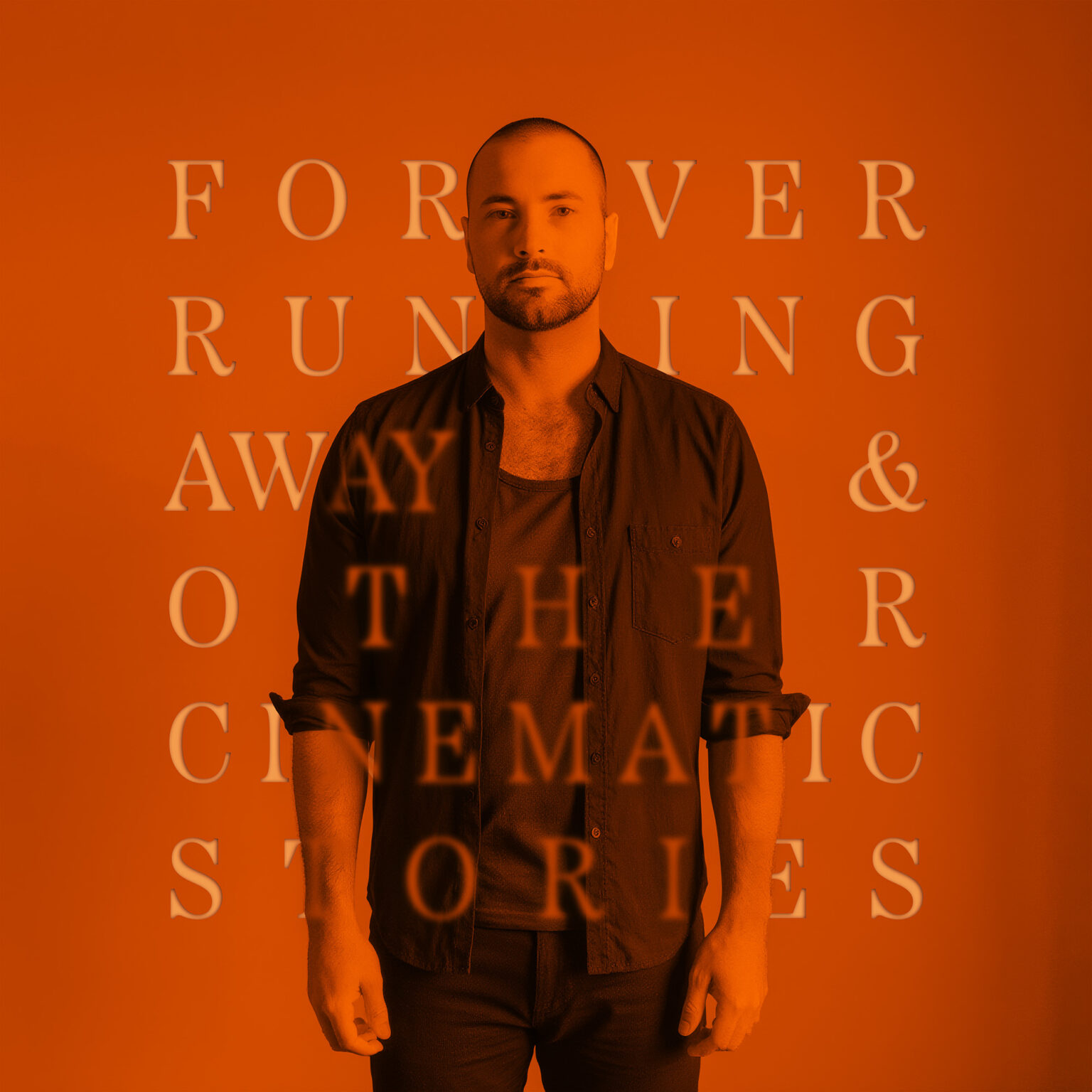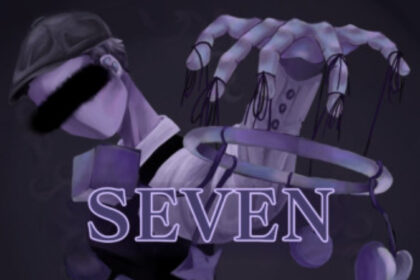In the world of modern cinematic composition, few names carry the quiet gravity of Dexter Britain. The British self-taught composer has spent the last decade bridging the gap between classical and contemporary worlds, his work weaving seamlessly through film, television, digital media, and the imaginations of millions. Yet, beyond his viral milestones and Creative Commons legacy, there’s something profoundly human about Britain’s music—a sense of journey, discovery, and emotional authenticity that makes each piece feel lived-in. With his new album, Forever Running Away & Other Cinematic Stories, Dexter Britain crafts an immersive 16-track collection that functions as retrospective and rebirth. It’s a lush, deeply reflective work that looks back on the past decade while propelling forward into new emotional and sonic terrain.
Opening with “Selling Houses,” the album wastes no time setting its cinematic tone. The piece begins in quiet contemplation—delicate piano notes tracing the shape of solitude—before strings begin to rise, bringing with them a gentle tension that mirrors the act of letting go. The title itself carries metaphorical weight: the emotional sale of one’s past, the transition from stability to uncertainty. Britain excels at this kind of storytelling without words; every crescendo feels like a question, every pause like a heartbeat held in suspense. It’s a fitting overture, announcing both the intimacy and scale that define the album as a whole.
From there, “Journey to Apex” lives up to its title with breathtaking precision. Building from pulsing strings and rhythmic piano phrases, the track evokes urgency and triumph. It’s the sound of momentum—of chasing something just out of reach. The orchestration swells and releases like waves colliding against rock, each crash revealing another layer of color. There’s an undeniable cinematic flair here reminiscent of composers like Max Richter or Ólafur Arnalds, yet Britain’s voice remains unmistakably his own—less about grandeur for its own sake, more about emotional honesty. By the time the final chord fades, you feel lifted, as though you’ve arrived somewhere you didn’t realize you were going.
“Dauntless” and “Forever Running Away” form the emotional axis of the album’s first act. “Dauntless” is bold and percussive, driven by an insistent rhythm that pulses beneath sweeping strings. It captures motion at its most visceral—the feeling of pressing forward despite fear or fatigue. “Forever Running Away,” the title track, acts as its reflective twin. Here, Britain turns the energy inward, pairing a wistful piano melody with luminous orchestration. It’s as though he’s reimagining the spirit of his breakout The Time To Run from an older, wiser perspective. The restless energy is still there, but tempered by experience; it’s not about escape anymore, but evolution. The piece swells to a breathtaking climax before dissolving into stillness—a masterclass in emotional pacing and dynamic control.
The middle stretch of the album—“Goodnight,” “The Piano at the Cliff Edge,” and “The Hidden Key”—slows the tempo, allowing reflection to take center stage. “Goodnight” is tender, a lullaby steeped in melancholy; its simplicity is what makes it devastating. “The Piano at the Cliff Edge” lives up to its evocative name: sparse, echoing chords conjure images of isolation and awe, of beauty poised at the brink of danger. There’s something almost meditative about its pacing—each note feels deliberate, suspended in air. “The Hidden Key,” meanwhile, reintroduces subtle rhythmic motion beneath its introspection, suggesting the unlocking of some long-buried emotion. Together, these tracks form a trio of quiet contemplation—a deep breath before the next surge.
“Carnival Nocturne” and “Krampus” inject an unexpected theatricality into the record. “Carnival Nocturne” spins with whimsy and shadow, its waltzing rhythm tinged with mystery, like watching flickering lights at midnight through a fog. “Krampus,” on the other hand, is darker and more urgent—a taut, percussive piece with an undercurrent of menace. Here, Britain channels the tension and texture of cinematic scoring, his orchestral palette alive with contrast and movement. These tracks remind us that his storytelling extends beyond beauty—it embraces drama, playfulness, and even fear. They expand the album’s emotional scope, making its serene moments feel all the more earned.
The album’s emotional center returns in “It’s Okay, I’m Okay” and “Keep Going On,” two tracks that feel almost like personal affirmations. “It’s Okay, I’m Okay” blends gentle piano motifs with subtle string harmonies that radiate reassurance. There’s fragility in its phrasing, but also resilience—like someone relearning how to breathe. “Keep Going On,” meanwhile, brims with optimism. Its forward-driving rhythm and luminous orchestration capture the sense of renewal that runs through the entire album. These songs embody Dexter Britain’s greatest gift: his ability to make instrumental music feel conversational, as if each note were whispering encouragement directly into the listener’s ear.
In its final act, Forever Running Away & Other Cinematic Stories grows introspective once again. “Until The Light Returns” and “The Island” glide across atmospheric terrain, their delicate arrangements shimmering with melancholy hope. “Until The Light Returns” feels like dawn after a long night—its piano melody tentative at first, then resolute as strings bloom behind it. “The Island” carries that serenity forward, painting solitude as sanctuary rather than exile. Both pieces reveal Britain’s command of emotional nuance; even in their quietest moments, they pulse with life. Then comes “The Night Before Xmas” and “Running From My Problems,” the former a graceful, almost nostalgic piece tinged with wonder, the latter brimming with kinetic energy and self-awareness. “Running From My Problems” feels like the emotional echo of “Forever Running Away,” looping the narrative back to its beginning—a composer caught between motion and meaning, still searching, still creating.

The album closes with “The Time To Run (For String Quartet),” a reimagining of the piece that started it all. Stripped of its original bombast, this new version is tender and introspective, revealing the emotional core beneath the anthemic surface. It’s a perfect bookend—past and present in conversation, memory reframed through maturity. The string quartet brings an intimacy that feels almost private, like a thank-you whispered to the audience that has journeyed with him over the years. In this moment, Dexter Britain reclaims his most iconic work not as a monument, but as a living, breathing expression of who he has become.
Across its sixteen tracks, Forever Running Away & Other Cinematic Stories is a compilation of cinematic compositions and a self-portrait in motion. Britain balances grandeur and restraint, movement and stillness, heart and intellect, crafting a collection that speaks to the endurance of creativity and the beauty of impermanence. Each track unfolds like a scene in an unseen film, but together they tell a story that is unmistakably human. This is the sound of an artist returning to his essence while reaching for new heights—an album that confirms Dexter Britain’s place as a composer of cinematic music and a storyteller of the soul.
For more information, follow Dexter Britain:
Website – Spotify – Bandcamp – YouTube – Facebook







